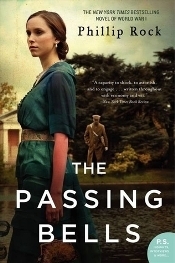Book review: The Passing Bells, by Phillip Rock
 Readers should be forgiven if they delve into Phillip Rock’s former bestseller and initially find themselves picturing Downton Abbey’s famous cast. The book has a similar premise — a noble English family and their servants have their lives upended by World War I — and more resemblances abound. The Countess of Stanmore is American, and her overseas relative disturbs the careful social hierarchy at their Sussex estate. Below stairs, a new housemaid learns her place. Their personalities come alive via elegant parties and cross-class love affairs.
Readers should be forgiven if they delve into Phillip Rock’s former bestseller and initially find themselves picturing Downton Abbey’s famous cast. The book has a similar premise — a noble English family and their servants have their lives upended by World War I — and more resemblances abound. The Countess of Stanmore is American, and her overseas relative disturbs the careful social hierarchy at their Sussex estate. Below stairs, a new housemaid learns her place. Their personalities come alive via elegant parties and cross-class love affairs. But the Grevilles aren’t the Crawleys, and as its new cover reminds us, The Passing Bells was here first. While equally as engrossing and full of nuanced characterizations, it offers an even meatier story, traveling places the show never ventured and addressing period issues through realistic, heartfelt drama.
The plot follows the younger generation almost exclusively. Charles, the Greville heir, timidly pursues rich businessman’s daughter Lydia Foxe, knowing his father disapproves, while Lydia and family friend Fenton Wood-Lacy deny their attraction. When war breaks out, all see their lives transformed. Chicago cousin Martin Rilke becomes the novel’s Everyman — his candid written observations on English aristocrats bring their differences home sharply — as his journalistic talents lead him to the front lines. The devastation at Gallipoli and the Somme has that much more impact when characters we care about are involved. Even Alexandra Greville, the pampered social-butterfly daughter, has a shocking coming-of-age.
From busy London newsrooms to a Yorkshire factory to the trenches, Rock is especially good at scene-setting and dialogue, and while his themes are unmissable, the characters’ engagement with their changing world is strong and moving. For some, war is futile, while for others, it gives their lives purpose. This fabulous reissue is tailor-made for post-Edwardian aficionados, who will be thrilled to know that two more volumes follow.
Originally published in 1978, The Passing Bells was reissued by William Morrow in trade paperback in December 2012 at $15.99. I enjoyed it so much that I requested the subsequent two titles for review, too. This writeup first appeared in the Historical Novels Review in February as an "online exclusive."
Published on February 11, 2013 18:38
No comments have been added yet.



